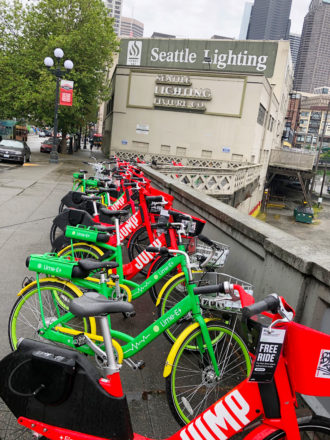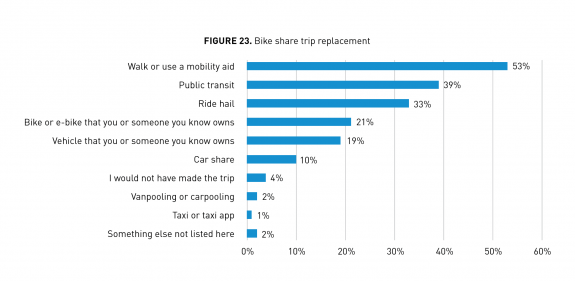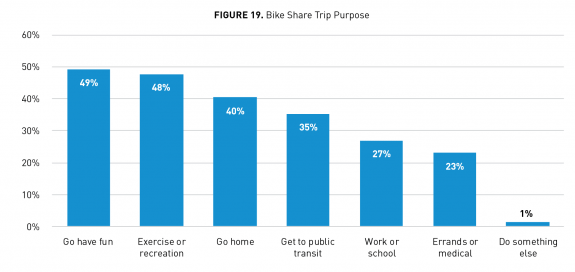
Seattle’s final operational bike share service just changed hands in yet another major shakeup in the private bike share saga.
Uber led a $170 million investment in a majorly devalued Lime, and Lime will take on Uber’s JUMP bike and scooter service as part of the deal. Though no valuation was made public, The Information reports that Lime’s value had dropped to $510 million, 79% lower than its valuation during its previous round of investments.
It’s not yet clear what this means for JUMP bike share service in Seattle, given that scooter-focused Lime pulled its own competing e-bikes from Seattle streets in December. Will Lime see this an opportunity to get back into bikes with better bikes? Lime’s e-bikes were often broken and had some dangerous battery fire problems. The company’s bike operations in Seattle never seemed to recover from a summer 2019 warehouse fire caused by an exploding battery.
Or will Lime kill JUMP and continue focusing on scooters? If they do, that could essentially be the end of fully private bike share. Lyft owns Motivate, the operator of major systems like Biketown in Portland, Citibike in New York and Divvy in Chicago. But though Lyft has long been in the permitting process for launching in Seattle, they have not done so.
For now, JUMP bikes can still be unlocked using the Uber app, though Lime announced on Twitter that users will soon be able to unlock JUMP bikes through the Lime app:
Big News! Starting soon, you will be able to unlock JUMP bikes and scooters through the Lime app! 2nd Street with the deets! 👇👇👇https://t.co/nB5RFqKj4S
— Lime (@limebike) May 7, 2020
Though private bike share was clearly already struggling, the outbreak has been tough for companies that were already operating without turning profits. Lime had to close markets across the world, and it’s not clear how eager people are going to be to touch shared bikes and scooters for the duration of the outbreak. JUMP staff have been disinfecting bikes whenever they are serviced, but not between all uses. It is up to users to take precautions.
Meanwhile, demand for buying (and repairing) personal bikes seems strong, though sales figures are complicated by the fact that so many bike sellers, distributors and makers have been closed for all or some of the outbreak period. Shimano, a major bike component maker, says first quarter sales were down 15% versus a year earlier. As with so many things right now, it may be a while before we really understand the impact of COVID-19 on the bike industry at large.
SDOT measured 2.2 million bike share trips in Seattle in 2019 between Lime and JUMP. A third of users said they have replaced ride hailing trips (like Uber) with bike share. 20% said they have replaced private car trips. And more than a third of users said they use bike share to connect to transit.

 Hopefully, JUMP bikes continue operating in Seattle. Bike share’s popularity has been a major reason biking was increasing so quickly before the outbreak hit. It’s not just the trips on bike share that matter, it’s also the fact that bike share helps people get back into biking in general. Bike share trips do not account for all the growth, but having bike share around likely inspired many people to give city biking a try.
Hopefully, JUMP bikes continue operating in Seattle. Bike share’s popularity has been a major reason biking was increasing so quickly before the outbreak hit. It’s not just the trips on bike share that matter, it’s also the fact that bike share helps people get back into biking in general. Bike share trips do not account for all the growth, but having bike share around likely inspired many people to give city biking a try.
But prices rose a lot last year, now at $0.25 per minute for a JUMP bike, and the number of competitors keeps shrinking. It may be wise to start thinking about the value city’s get from bike share and what role governments should play in making sure convenient and affordable bike share is available. But, of course, major budget shortfalls are coming to all levels of government due to the outbreak, making any near-term talk of public bike share investment tough.








Comments
5 responses to “Lime takes over JUMP as part of big Uber investment deal”
Does that end Jump’s offer of free 30 minute rides for essential workers?
Wow, now that’s a plot twist. I really hope electric bike share is here to stay. It’s such a useful resource getting around town, even for a bike owner like me I still use them all the time when I’m out and about, and especially for people that can’t afford and/or dont have a place to store their own bike. I’ve also seen how useful they are for people avoiding traffic during rush hour and large events.
I was wondering how long the fantasy would last of wealthy venture capitalists providing money-losing bike rental under the future premise of monetizing people’s trip data.
This deal is just further proof of how messed up our economy is.
Uber has never been profitable and has shown no signs of reaching or even desiring profitability, in fact the exact opposite. You have companies like Amazon that didn’t post a profit for years, because they was reinvesting what would have been profits back into the company to further growth and wisely so. Uber doing nothing of the sort. (Disclaimer: I despise both Uber and Amazon)
Uber lost $8.5 billion just last year. 2 days ago, they announced layoffs for nearly 1/6 of their staff. Ignoring the question of how can they afford to buy Lime, why are they buying Lime, who is hemorrhaging money at a slightly slower rate than Uber?
Our economy has become some bizarre house of cards propped up by imaginary money thrown around by the uber rich (pun intended) like it’s a game.
Rant over. Best of luck to Lime, these bikes are a valuable resource for our City!
Lime said pretty openly that they didn’t see a future in bike rental in Seattle or anywhere else. I would doubt that the current situation means much change in that position. The scooters IMHO are stupid. Those smalll wheels on Seattle’s third world pavement is a great boost for ER visits not getting people to use alternatives to cars.